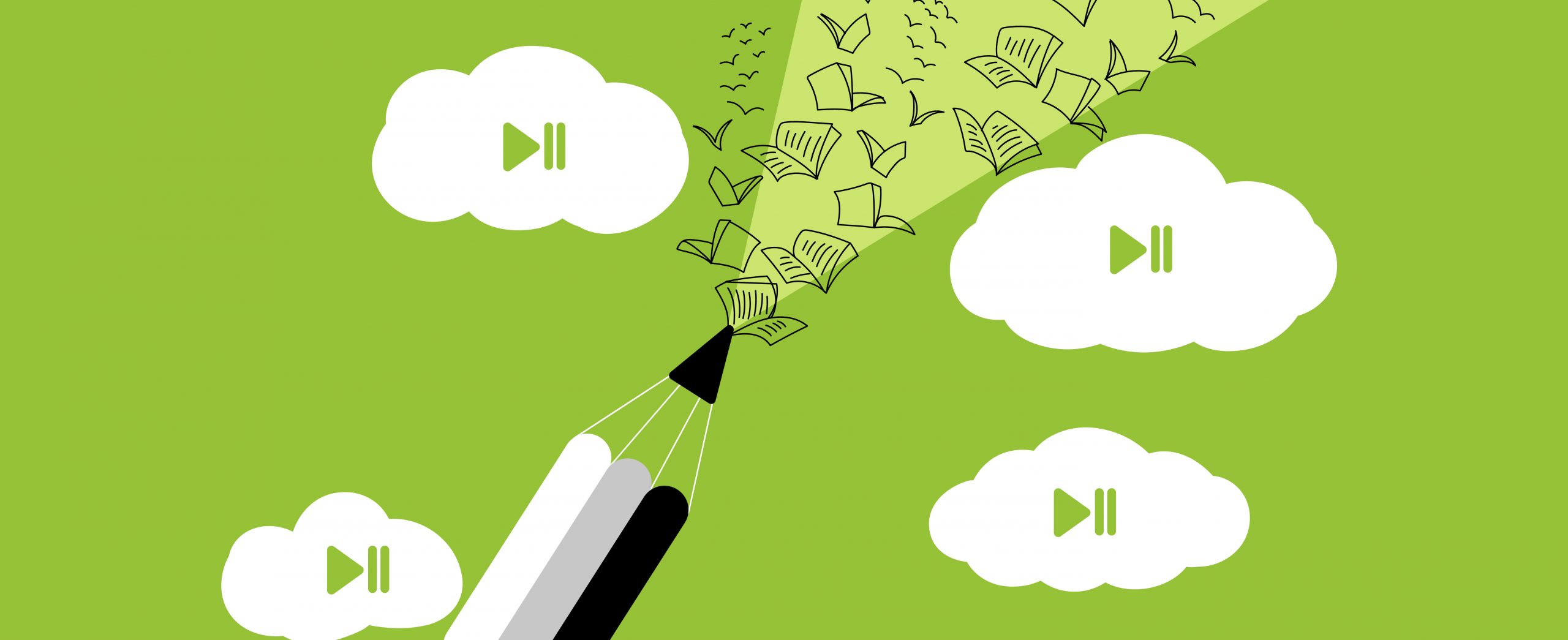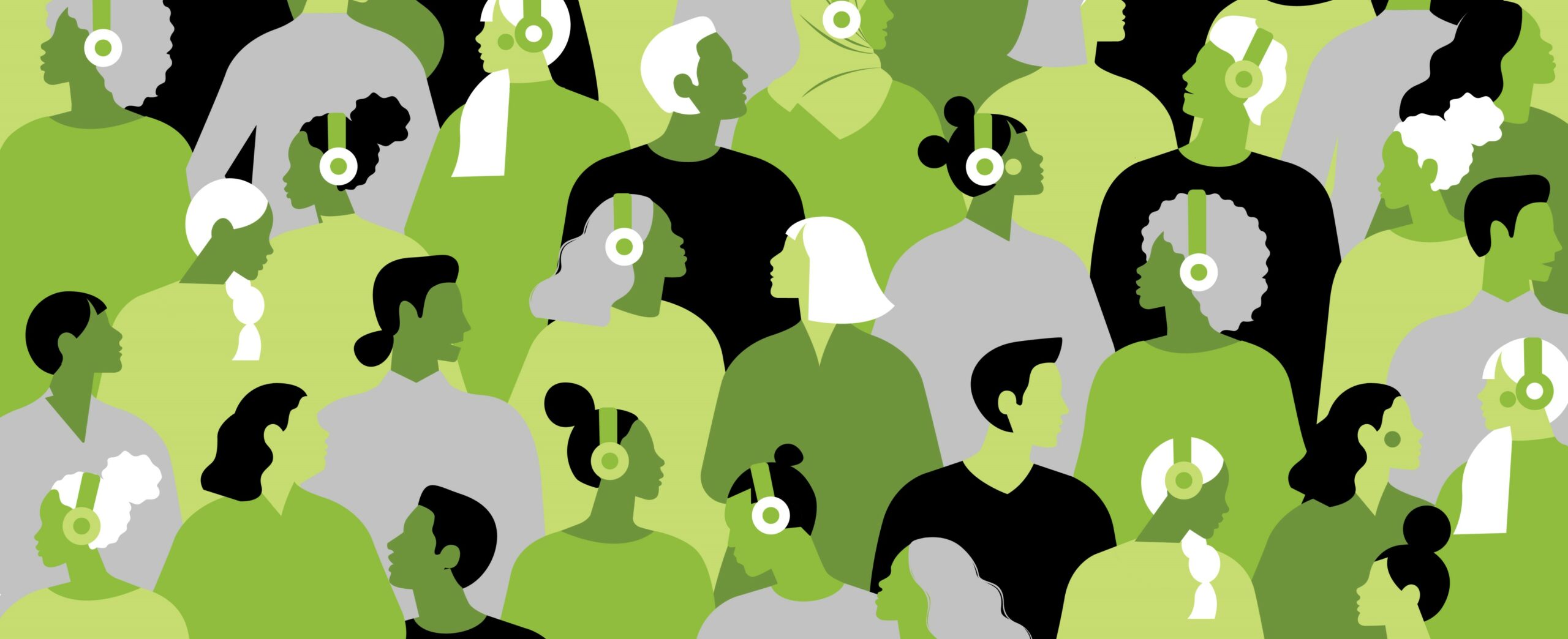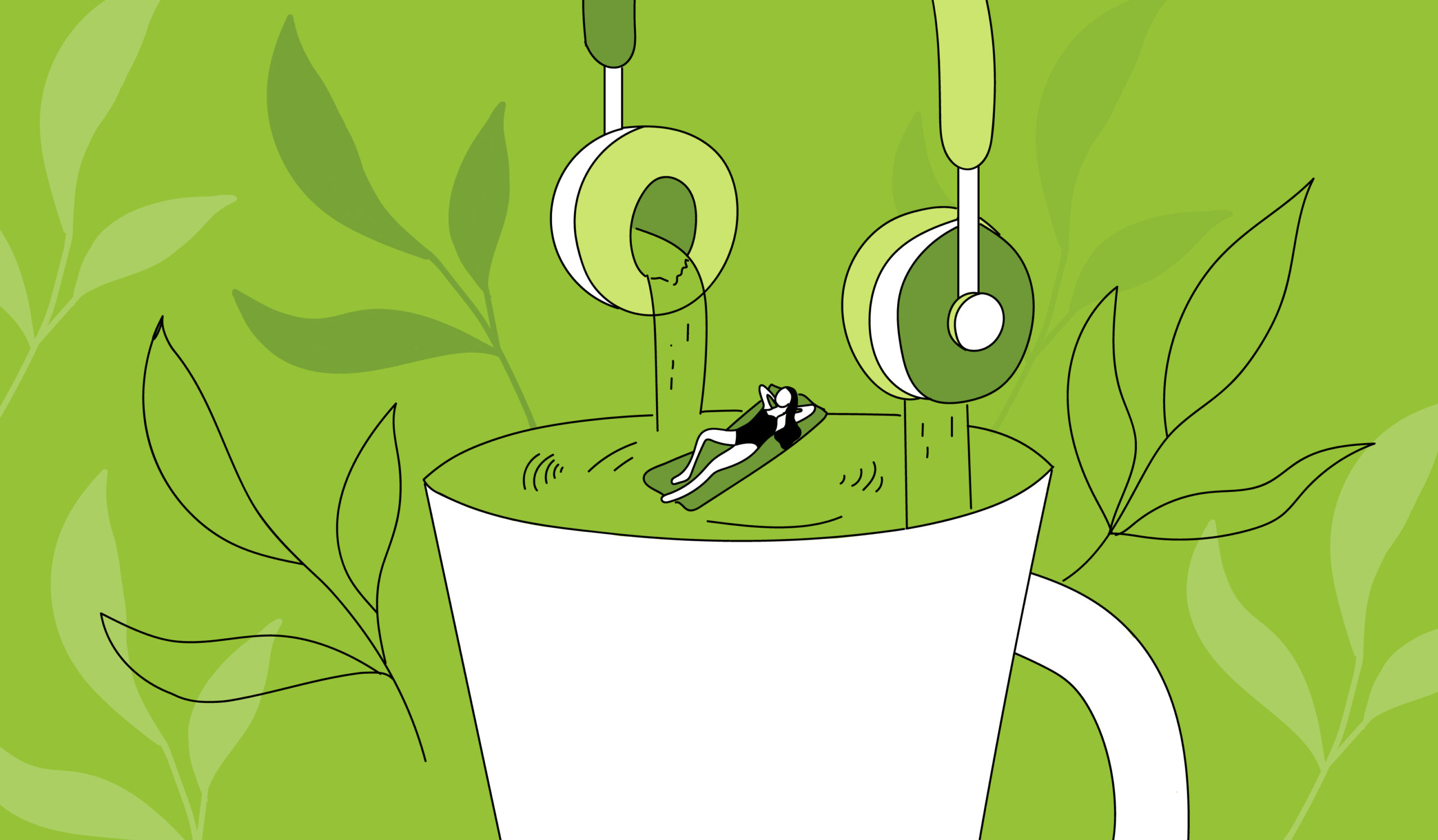
‘A voice in the darkness’: Audiobooks in times of uncertainty
Robin Whitten of AudioFile Magazine and the rise and rise of audiobooks in 2021
Human beings have been storytellers for as long as we have been capable of abstract thought.
The power of the spoken word transports us to imagined worlds and transcends the preoccupations – and dangers – of daily life. Storytelling offers us companionship and takes us to a place where we find comfort and peace.
It’s this deeply ingrained and very human instinct that compels mothers and fathers to read aloud to their children at bedtime, as our ancient ancestors once huddled, wide-eyed, around the safety of a campfire and listened while a wise woman or man recalled tales of gods, ancestors and great deeds.
It’s no wonder, then, that during the dumpster-fire year that was 2020, we sought solace in audiobooks.
Robin Whitten, founder and editor of AudioFile Magazine, isn’t surprised by figures showing an unprecedented boom in demand for audiobooks. ‘In 2020, we’ve heard that a lot,’ she says. ‘Many listeners have found escape through the portal of storytelling, even if they can’t always articulate the comfort that comes from leaving what has been a very difficult and dangerous situation for so many of us.’
As the founder of what’s described as the audiobook industry’s bible, Whitten is better qualified than most to assess the state of play. ‘2020 has been terrible for many reasons,’ she says. ‘But audiobooks? They’re having a great year!’
Figures from the publishing industry paint a very optimistic picture of the industry’s prospects. While global sales of printed books by UK publishers plunged by 55 million in the first six months of 2020, sales of consumer audiobooks jumped 42 per cent. In the US, 50 per cent more audiobooks were downloaded by parents looking for a way to stop housebound children from climbing the walls. And in Australia, figures released in October pointed to an expanding consumer base, with 37 percent of first-time audiobook listeners making their first purchase in 2020.
‘Audiobooks have been giving a great deal to a lot of people,’ Whitten explains. ‘And whether it’s the escape, or the information – because there has also been such huge interest in so many of the important non-fiction books and memoirs this year – for so many people, audiobooks have been a real lifeline.’
Arianna Rebolini, BuzzFeed News’ book editor, captured this sentiment in an article titled: ‘Audiobooks are – and I can’t stress this enough – saving my sanity during COVID-19.’ ‘Being a mother during a pandemic made reading almost impossible,’ she wrote. ‘Then I started listening … The more I listened, the more I wanted to listen. It’s also made me realize some books are especially engaging in audio – some, I’d wager, are even better when you listen to them.’
And that, according to Robin Whitten, is the point. The best audiobooks can eclipse the printed word. ‘The storyteller’s art evolved from an oral tradition,’ she says. ‘Many books are written as if someone is telling you a story. So the natural extension is to hear someone read that story out loud. Because, in essence, the author is the storyteller – and in an audiobook, the narrator assumes the author’s voice. And that’s an incredibly rich experience.’
There’s a good reason we’re tuned in to the storyteller’s art. Human beings have been telling each other stories for tens, if not hundreds, of thousands of years. The creation stories kept alive by Australia’s Aboriginal people – the world’s oldest continuing culture – belong to an oral tradition nurtured by a people who have lived on the Antipodean continent for at least 60,000 years.
With the dawning of self-awareness, our ancient ancestors began to wonder about the world and their place within it. Stories became a way of finding meaning and purpose in what might otherwise be a baffling existence. And for most of our time on this planet, those stories have been preserved and communicated through the spoken word.
By comparison, written language is new tech. The first marks that can be described as ‘writing’ date back just 9000 years or so. But they were prosaic things: the historical equivalent of an Excel spreadsheet, keeping track of the exchange of goats and sheep, and taxes paid to the king. We didn’t have anything resembling a written work of literature until 4000 years ago, when an adventurous Mesopotamian scribe decided that the Epic of Gilgamesh warranted preservation in a more tangible form.
Even after printing was invented, which in the scale of human history was pretty much yesterday – the 15th century in Europe, and about 800AD in China – printed books were inaccessible to most people. They were scarce and expensive, and even if your average person managed to get his or her hands on one, the scribblings on the page were meaningless to most.
So listening to an audiobook is comforting, because it’s what we know best. ‘A storyteller can transport you like a magic carpet, carrying you away to a world which is so very different to your own,’ Whitten explains. ‘And in audiobooks, a brilliant narrator is like the pied piper.
It doesn’t really matter where they’re taking you, you’re going to go with them. That’s the sign of a really good storyteller. From the very first sentence, you trust them.’
Not surprisingly, Whitten has no time for audiobook snobbery – the idea that having a book read to you, rather than reading a book in print, is an intellectually inferior pursuit. And now she has scientific proof to quiet the naysayers. Neuroscientists at the University of California, Berkeley, have shown that the same parts of our brain are activated whether we’re reading a story or listening to it. Further research has also shown that we achieve the same level of comprehension whether we listen to a book or read it ourselves. Take that, audiobook snobs!
Whitten’s own introduction to audiobooks came about through desperation. ‘Years ago, I was driving a lot,’ she explains. ‘And radio reception was often lousy. Someone suggested I try an audiobook from the library. There was something about the way that story was read – it was Frank Muller reading John le Carré’s Call for the Dead
– and even though I’d just pulled up after three and a half hours driving, I couldn’t bring myself to leave the car … I was that engrossed. And that made me think, “What is it that this actor is doing that has riveted me to this story?”’
‘There was something so special going on,’ Whitten continues. ‘And that’s the thing – in an audiobook, you get such a rich picture beyond the wonderful written words, far beyond what you, as an ordinary reader, can conjure up inside your own head.’
Surprised to find there was no review system in place that took account of the narrator’s performance, Whitten – whose father was the publisher of Harper’s magazine – was spurred into action. ‘I decided to write a little newsletter about audiobooks reviewing the narrators’ performance. So AudioFile started as an eight-page pamphlet.’
Whitten and I are sharing that oh-so-2020 experience that is the Zoom meeting. Her backdrop is floor-to-ceiling AudioFile covers, which I’m a little disappointed to learn is a digital device rather than actual wallpaper in her home office. Whitten laughs when I suggest it would make for a very striking feature wall. ‘But then I couldn’t keep updating it! This way, we just add a new image after every new edition!’
In the 29 years since Whitten launched AudioFile, its footprint has expanded to include a website, blog, newsletters and daily podcasts, and the magazine is now published six times a year. ‘I can’t believe how much we’ve grown,’ Whitten says. ‘Now, we review 2400 titles annually.’
Of course, like the rest of us, AudioFile has had to adjust to the pandemic. ‘We’ve been very careful,’ Whitten says. ‘Everyone is working remotely. Our reviewers come from all over the place, and work from digital copies anyway, so that process hasn’t changed much. Although some people have more time to listen and review because they’re at home, others who used to review while they commuted haven’t been able to do that. But we’ve been getting in more reviews than we did a year ago.’
The reviews focus on the way narration adds to the reading experience. It’s the thing that Whitten believes sets audiobooks apart from printed books. ‘If you’ve listened to an audiobook in a series and the narrator gives you the characters’ voices, when you go back to the printed version, it feels like something’s missing,’ she says. ‘It happens to me all the time.
For instance, I’ve listened to a lot of Kerry Greenwood’s Phryne Fisher audiobooks and really enjoyed them. But I tried to read one of her print books, and felt I really needed to hear the voices. I miss that sense of pace when I’ve listened to audio and heard how dynamic sound can make the experience.’
At the heart of that experience is the personal connection that comes from having somebody read you a story. ‘It can be so powerful and emotionally involving because it’s so intimate,’ Whitten says.
As so many of us were forced into physical and social isolation in 2020, audiobooks have offered many readers a level of intimacy and human contact that doesn’t exist when we pick up a printed book, because reading words on paper is a fundamentally introspective and solitary pastime.
‘Listening to audiobooks has become so important to so many families,’ Whitten says. ‘It harks back to radio plays, and the time when people used to watch television together. Now, with digital devices and the internet, you could have three people in the same room, and they could all be getting information from different sources. But to share the experience of hearing a voice telling a story together – it creates a precious bond.’
‘I can remember listening to The Power of One with my son,’ she continues. ‘It led to us really talking about apartheid. That’s why when you share an audiobook with your family, it’s a very special experience. You never read the same book at the same time, do you? This is totally different. It’s like going to a movie together.’
While she acknowledges that COVID-19 has increased the appetite for audiobooks, Whitten knows that 2020 is not an outlier. ‘There’s been a definite rise in demand over the past decade,’ she says. In June, Chris Lynch of the Audio Publishers Association was over the moon, describing the ‘eight straight years of double-digit revenue growth’ in sales and consumption as ‘simply phenomenal.’
Another fact that has audiobook publishers excited is that in the US in 2019, 50 per cent of Americans aged 12 and above said they had listened to an audiobook. 57 per cent of frequent audiobook listeners are under the age of 45.
This delights Whitten. ‘One of the most exciting elements of growth is the interest young people have in audiobooks,’ she says. ‘There’s not the same stigma for people in their 20s and 30s. Not that I don’t love older readers! But the future is in the younger readers.’ Whitten believes she knows what’s driving this revolution. ‘This is a media generation. They don’t have the same psychological barrier to accessing and using non-traditional media. I think the general interest in podcasts among younger people came on very quickly, and that makes those listeners interested in long-form audiobooks as well.’
‘Downloadable audio has changed the game in terms of access,’ she continues. ‘You don’t have to go to the library to pick up the CDs, or muck around with the device required to play the books. These days, the device many of us use to read an audiobook is in our pocket all the time.’
As our Zoom time together draws to a close, I ask Whitten what she’ll remember the most about 2020. ‘Well for one thing, I’ll never forget how nice it is to see other people’s faces. Today, one of our editors came to my house to pick up a box of assignment sheets. She didn’t come inside, of course. But even though it was freezing cold outside, we stood on the street chatting for far longer than we should have, because we hadn’t seen each other for so long.’
She pauses. ‘You know, I’m sure that’s why audiobooks have meant so much to people this year. They’ve been at home with their routines disrupted, many of them are alone and afraid – and audiobooks have given them something to hold on to. And, really, what more could you want?
Written by – https://meaghanwilsonanastasios.com/
Learn more about Robin – https://www.audiofilemagazine.com/




